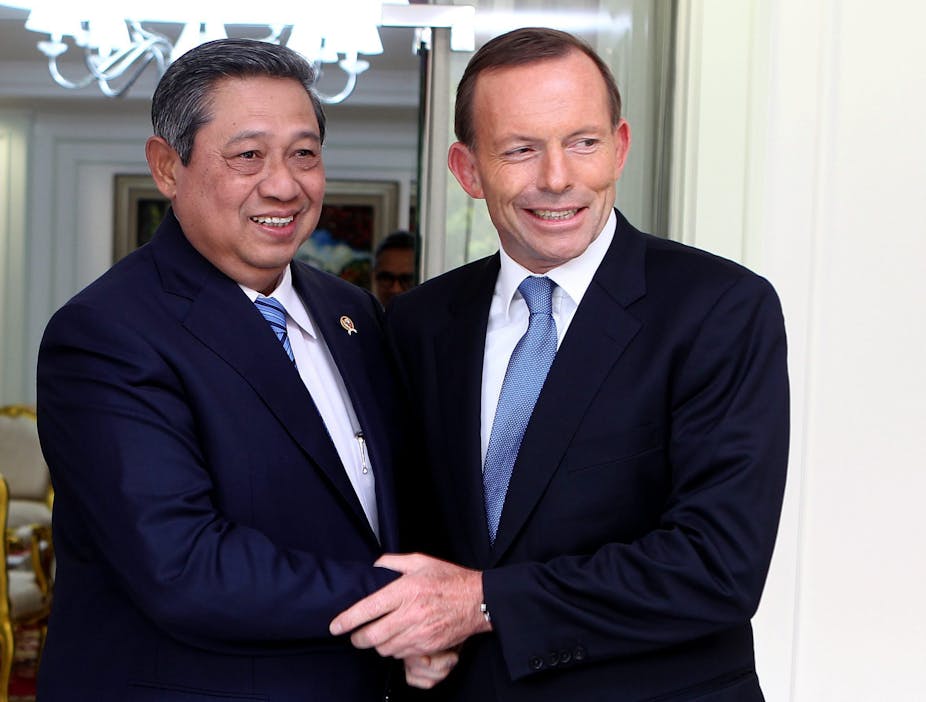Australia’s recent federal election was – as usual – won and lost primarily on domestic policy issues. Unlike his predecessor, new prime minister Tony Abbott made no claims to great expertise in foreign affairs. Abbott talked about devising a Jakarta-focused foreign policy, rather than a Geneva-based one: a catchy phrase, but one with little meat on its bones.
The closest Abbott came to talking about relations with Indonesia was in connection with the asylum seeker issue, where he repeatedly assured the electorate he would “stop the boats”. He also told us he would buy Indonesian fishing vessels to stop them being used to transport asylum seekers to Australia, and pay Indonesian community leaders for information on people smugglers. Abbott is likely to visit Indonesia to meet with president Susilo Bambang Yudhoyono before the end of the month.
But just one week after his election victory, Jakarta is already raining on Abbott’s parade. Indonesian foreign minister Marty Natalegawa told the Indonesian parliament clearly – and utterably predictably – that Jakarta did not accept the basic thrust of Abbott’s policies:
We will reject his policy on asylum seekers and any other policy that harms the spirit of partnership.
Both Abbott and Australia’s new foreign minister Julie Bishop must have known that such a response would be forthcoming once the election campaign was over. This makes Julie Bishop’s response all the more puzzling. She asserted of the Coalition’s policies that they:
…will not breach Indonesia’s sovereignty. We’re not asking for Indonesia’s permission, we’re asking for their understanding.
It’s hard to see which part of the Coalition’s plan Bishop believed would not be seen in Jakarta as threatening Indonesian sovereignty. Turning the boats back might not, provided the boats were not directed into Indonesian waters - which would seem to defeat the whole purpose of the exercise. But it’s difficult to argue that setting up an intelligence-gathering network in Indonesia - and operating a boat-buying business in that country - could be done without Indonesian permission. Certainly no Indonesian politician is going to make that case.
As an aside, if Australian intelligence officers in Indonesia are not currently buying information about people smugglers, we could justifiably ask why not.
The Coalition’s position is made the more complicated by new agriculture minister Barnaby Joyce’s spirited rejection of the idea of Indonesian purchases of Australian pastoral land to produce cattle for export back to Indonesia.
From the Indonesian end, the public face of this idea has been state enterprises minister Dahlan Iskan. Iskan is one of 11 candidates vying for the presidential nomination of SBY’s Partai Demokrat. His cause will not be harmed at all by taking on the Australian government on this issue, or at least taking on one vocal part of that government. The details of exactly how the Coalition works are not widely appreciated in Indonesia.
One wonders if Iskan might be tempted to take a leaf out of Bishop’s book and declare: we are not asking for Australia’s permission, we’re asking for their understanding. If he did, there’s no prizes for guessing how Australia would react.
The danger for the Coalition is that their whole approach to Indonesia becomes dominated by chest-beating on the asylum seeker issue, and (less significantly) the cattle trade. These are important issues. But there many others in the relationship that need to be addressed.

Perhaps the basic challenge Tony Abbott faces is how to build domestic political support for his stated foreign policy aim of prioritising Jakarta over Geneva in Australian foreign policy. This won’t be easy. It is a challenge many of his predecessors have tried to address but failed to meet.
As any number of observers have pointed out recently, the current level of understanding about Indonesia in Australia is abysmal. It is matched perhaps only by our level of interest in the country. It is ironic that Australian public and commercial interest in Indonesia was much greater when the country was under authoritarian, military-backed rule than it is today, when it is an electoral democracy.
So, how does the Coalition plan to address this issue?
The New Colombo Plan is an excellent idea which, if successful, could begin to wear down outdated stereotypes. Indonesia has been identified as a priority target country. However, making the plan work will clearly require Indonesian cooperation. Indonesia will need to simplify its cumbersome visa system for a start.
But any pressure from Australia for Indonesia to loosen visa requirements for Australian students is likely to fall on politically deaf ears if the Coalition pushes back hard on asylum seekers. You can hear voices in Jakarta channelling former Australian prime minister John Howard already: we determine who comes to this country, and the conditions under which they come.
We need to stop treating issues in the Indonesia relationship as discrete entities, able to be picked off and addressed in isolation, and recognise that they are connected.
And recognise too that, just as in Australia, foreign policy positions in Indonesia are usually grounded in domestic concerns. Can the Coalition’s approach to Indonesia on asylum seekers be understood outside the domestic Australian context? Of course not. The situation is no different with respect to Indonesian reactions to that policy.

